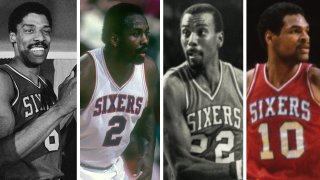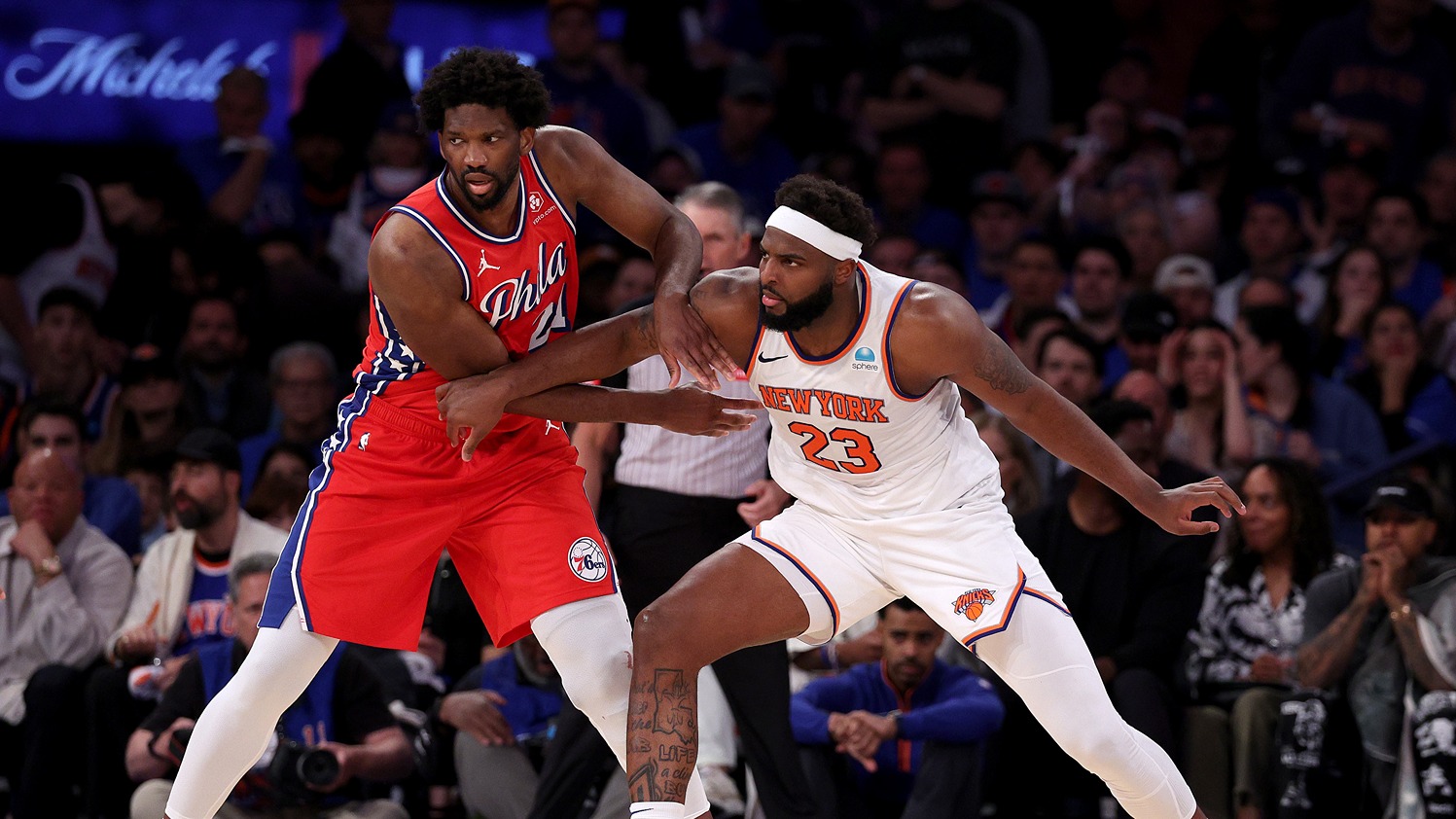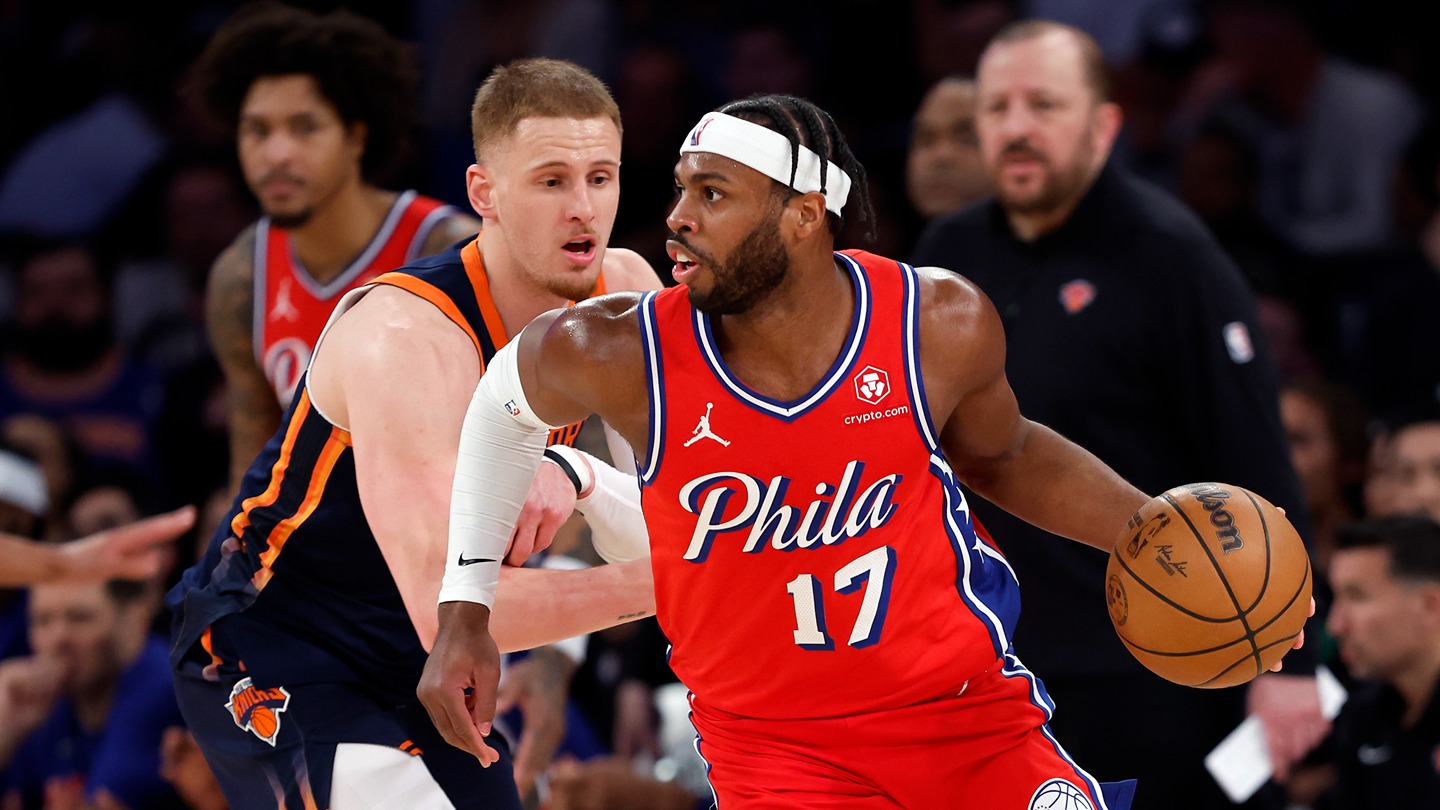
Thirty-seven years ago, the Sixers had a 2-0 lead in the NBA Finals and were two wins in Los Angeles away from a championship.
NBC Sports Philadelphia will be re-airing that series this weekend, showing Game 1 on Friday night, Game 2 Saturday and Games 3 and 4 Sunday.
We’ll have stories to come on that team, which won 65 games in the regular season and came one game away from a perfect postseason. We begin today with a ranking of the 1982-83 Sixers’ 10 most important members.
Stay in the game with the latest updates on your beloved Philadelphia sports teams! Sign up here for our All Access Daily newsletter.
10. Earl Cureton
Cureton didn’t play heavy minutes in 1982-83 as a backup to league MVP Moses Malone. In the playoffs, he played even less. But he did step up in a big spot when the Sixers needed him. With Malone in foul trouble in Game 2, Cureton was forced into action. Though it doesn’t look like much on a score sheet, he got the Sixers through 17 minutes without Malone that night in a 103-93 win.
9. Clemon Johnson
The Sixers picked up Johnson in a February trade with the Pacers, and he was a solid backup big man. Malone had played a league-high 42 minutes per game the previous season with the Rockets, but he was able to average "only" 36.6 minutes after Johnson’s arrival and be sharp for the playoffs.
8. Marc Iavaroni
Bobby Jones may have been the Hall of Famer, but it was Iavoroni who actually started in 1982-83. The 26-year-old rookie had just finished four years playing overseas after his college career ended. On a team loaded with All-Stars, Iavoroni was a glue guy. He wasn’t afraid to get physical and do the little things his team needed. While the stats won’t wow you, make no mistake, Iavoroni was a big part of that championship run.
7. Clint Richardson
Richardson was valuable as the team’s primary guard off the bench. He stepped up in the Sixers’ Game 1 Finals win when Maurice Cheeks got into foul trouble, playing 31 minutes and recording 15 points, four steals and three assists.
NBA
6. Billy Cunningham
You have to show some love for the man running the show. Though 1982-83 was Cunningham’s only title with the team, he’s easily the best coach in Sixers history. He coached and won more games and has the highest winning percentage and most playoff wins of any coach in franchise history. Cunningham was also a Hall of Fame player for the Sixers, helping capture a title in 1966-67.
5. Bobby Jones
“The Secretary of Defense” earned the NBA’s inaugural Sixth Man of the Year award in 1983 after starting 73 games in 1981-82. As always, he was one of the league’s better defenders and finished the season third in defensive box plus-minus. Jones had 13 points on 6 for 7 shooting, four steals and two blocks in the Finals clincher.
4. Andrew Toney
While Toney is often looked at as a “what if” story, the healthy version of the guard was a crucial part of the 1982-83 team. He made the first of his two All-Star teams that season, averaging 19.7 points and 4.5 assists a game. He was just as critical in the playoffs, averaging 22.1 points in the Eastern Conference and NBA Finals. “The Boston Strangler” appeared to be destined for the Hall of Fame before serious foot issues derailed his career.
3. Maurice Cheeks
Cheeks made his first of four career All-Star Games in 1982-1983, and it was a well-deserved selection. He was a reliable presence, starting 79 regular-season games and all 13 playoff contests, and an excellent defender and distributor. Cheeks posted 12.5 points, 6.9 assists and 2.3 steals per game. Most importantly, he got the stars the ball when and where they needed it and conducted the team with ample poise and intelligence.
2. Julius Erving
For most of his Sixers career, Dr. J would probably be No. 1 on a list like this. Though he wasn’t quite at the peak of his powers at age 32, Erving was still an unreal athlete and an All-Star. He averaged 21.4 points, 6.8 rebounds, 3.7 assists, 1.8 blocks and 1.6 steals in the regular season. While his scoring numbers were down slightly during the playoff run, his defense was on another level. He averaged 2.1 blocks a game that postseason, including 11 in four NBA Finals games. Erving needed a boost from Malone to get him over the top, but it was still a 1 and 1A type of situation with the pair of Hall of Famers.
1. Moses Malone
It’s difficult to exaggerate how good Malone was in his prime. After being traded from Houston to Philadelphia, he won a second consecutive MVP award, led the league in rebounding for a third straight season and helped the Sixers finally overcome the Lakers. He also was a clear choice for Finals MVP, averaging 25.8 points and 18 rebounds in the series. Even if the Sixers didn't pull it off, fans will always remember his bold "fo', fo' fo'" prediction and how he nearly backed it up with his play. GM Pat Williams' deal to add Malone is one of the best trades in Sixers history, and the 1986 trade that sent him to the Bullets is one of the worst.
Subscribe and rate Sixers Talk: Apple Podcasts | Google Play | Spotify | Stitcher | Art19 | YouTube
Click here to download the MyTeams App by NBC Sports! Receive comprehensive coverage of your teams and stream the Flyers, Sixers and Phillies games easily on your device.


